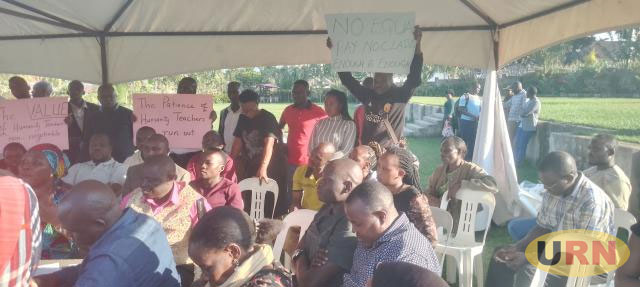
Masaka, Uganda | THE INDEPENDENT | Students in candidate classes are at risk of failing to complete the syllabus, as teachers of arts subjects in government schools maintain their strike to demand salary enhancements.
For three weeks now, teachers of humanities subjects in government secondary schools have been on industrial action, protesting the current salary disparities with their science counterparts.
Michael Ssebulime, a senior six student at Nakyenyi Secondary School in Lwengo district, has appealed to the government to respond to the demands of teachers to enable them to resume classes as they approach their final examinations.
He indicates that the industrial action has also affected science students, whose combinations include humanities as part of the principal subjects, and according to him, they are the majority.
Ssebulime, whose science combination includes physics, economics, and mathematics (PEM), says he has not seen his economics teacher ever since the strike began and is afraid that he may fail to pass the exams because they have not yet completed the syllabus.
“The majority of the science students either study economics, entrepreneurship, geography, or information technology, subjects that are categorized as humanities,” he says.
Steven Kinene, a teacher of English literature and general paper at Nakyenyi Secondary School, says they are aware of the apparent fears of their candidates but blame the stalemate on the government that is hesitant to honor their demands.
He says they have taken a bold decision as the Greater Masaka Teachers of Humanities Fraternity to sustain the industrial action until the government responds to the concerns.
Maxi Emaru, a geography teacher at Bishop Dunstan Secondary School in Kalangala district, has called upon the affected students to press the government harder such that it can resolve the stalemate.
He indicates that they had advised students in candidate classes to use the peer-to-peer learning approach and group discussions as they waited for the government to provide a sustainable solution, but in vain.
Emalu argues that in its indifferent attitude, the government has betrayed both the candidates and teachers despite their patience and hard work in providing the services.
Similarly, Onesmus Rukundo Rurihona, the headteacher of Kihanga Secondary School in Mparo town council, Rukiga district, says the continuous strike has rendered students studying arts redundant.
According to him, one of the ten arts teachers at the school has turned up for duties since the start of the strike on June 6th, indicating that, as the administration, they have only been putting in place measures to ensure that the students remain disciplined as they wait for the government’s action.
Joseph Akankwasa, head teacher of Rukore High School in Ryakarimira town council, Kabale district, says that in the meantime, they are encouraging the affected students to utilize the library and computer laboratory to do research and teach on their own.
He says students have reached the point of demanding to know the fate of their academic future, fearing that the strike is going to negatively affect their performance.
Last week, the Minister of Ministry of Education and Sports, Janet Museveni, met with the executive of the Uganda Professional Humanities Teachers Union (UPHTU) and asked them to return to class, promising that the government will systematically enhance their salaries starting with the 2026/27 financial year.
Robert Bwanika, the UPTU representative for Greater Masaka, says that they are still consulting with the regional executive committees on their final decision, which they will also communicate to the Ministry later this week.
****
URN
 The Independent Uganda: You get the Truth we Pay the Price
The Independent Uganda: You get the Truth we Pay the Price



